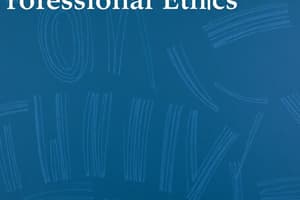Podcast
Questions and Answers
Which of the following is NOT a principle that guides teachers in their roles according to the text?
Which of the following is NOT a principle that guides teachers in their roles according to the text?
- Integrity
- Creativity (correct)
- Respect
- Accountability
What role does continuous professional development (CPD) play in fostering ethical behavior among educators?
What role does continuous professional development (CPD) play in fostering ethical behavior among educators?
- Enhancing knowledge base and adapting to technological advancements (correct)
- Disregarding legal requirements and societal expectations
- Avoiding participation in technology-enabled learning environments
- Limiting skill acquisition and growth opportunities
What is one of the issues that codes of conduct and professional ethics may address, based on the text?
What is one of the issues that codes of conduct and professional ethics may address, based on the text?
- Participation in technology-enabled learning environments (correct)
- Using private tuition as the primary teaching method
- Disregarding legal responsibilities
- Avoiding any form of professional development
How do codes of ethical standards help teachers, as mentioned in the text?
How do codes of ethical standards help teachers, as mentioned in the text?
What aspect does professional ethics serve as according to the text?
What aspect does professional ethics serve as according to the text?
What is the primary purpose of requiring courses on ethics, laws, and regulations in teacher licensure programs?
What is the primary purpose of requiring courses on ethics, laws, and regulations in teacher licensure programs?
Which of the following is NOT a potential consequence of violating the code of ethics for licensed teachers?
Which of the following is NOT a potential consequence of violating the code of ethics for licensed teachers?
What is the primary benefit of incorporating real-life scenarios and case studies into teacher training programs, according to the text?
What is the primary benefit of incorporating real-life scenarios and case studies into teacher training programs, according to the text?
What is the primary role of maintaining a good standing with the licensing board for licensed teachers?
What is the primary role of maintaining a good standing with the licensing board for licensed teachers?
What does the text suggest as a way to support the professional growth and development of experienced teachers in terms of ethical practices?
What does the text suggest as a way to support the professional growth and development of experienced teachers in terms of ethical practices?
Flashcards are hidden until you start studying
Study Notes
Teachers and Professional Ethics
Understanding Professional Ethics
Professional ethics refer to the principles and standards that guide professionals in their conduct and decision-making processes. These guidelines ensure that individuals maintain high standards while performing their roles and responsibilities. When applied to educators, professional ethics outline the proper conduct and expectations for teachers in relation to their duties towards students, colleagues, parents, and the broader community.
Role of Professional Ethics in Education
Professional ethics serve several purposes in the field of education. Firstly, they provide guidance for teachers on how to navigate potentially difficult situations and dilemmas. They also help establish trust between the educator, students, parents, and the community by promoting transparency, honesty, and fairness. Additionally, professional ethics contribute to the overall quality of education by ensuring that all stakeholders receive respectful treatment and equal access to resources.
Elements of Professional Ethics for Teachers
Professional ethics for teachers typically include the following aspects:
- Integrity: Ensuring that all actions align with moral principles and values, demonstrating honesty and trustworthiness.
- Respect: Treating all individuals with dignity, recognizing their worth as unique beings, and promoting inclusivity.
- Competence: Continuously updating knowledge and skills to provide high-quality education.
- Confidentiality: Respecting the privacy of students' information and maintaining confidentiality except when required by law or in emergencies.
- Accountability: Taking responsibility for one's actions and addressing any issues arising from those actions.
Codes of Conduct and Professional Ethics
Institutions may have codes of conduct and professional ethics to guide teachers on appropriate behavior and decision-making processes. These codes often incorporate legal requirements and societal expectations, providing a framework for self-regulation within the profession.
A code of ethical standards helps teachers make independent judgments about the most appropriate course of action while guiding them towards actions that are acceptable or prohibited. Codes may address issues such as drug usage, private tuition, and participation in technology-enabled learning environments.
Importance of Continuous Professional Development
Continuous professional development (CPD) plays a crucial role in fostering ethical behavior among educators. Through ongoing training and skill acquisition, teachers enhance their knowledge base, learn new skills, and adapt to technological advancements, contributing to improved instruction and student growth.
In conclusion, professional ethics serve as a cornerstone of quality education. Guided by principles such as integrity, respect, competence, confidentiality, and accountability, teachers navigate their roles with transparency, fairness, and a commitment to excellence. Regular professional development further strengthens these values, ensuring that educators stay updated and equipped to meet the evolving needs of their students.
Studying That Suits You
Use AI to generate personalized quizzes and flashcards to suit your learning preferences.




